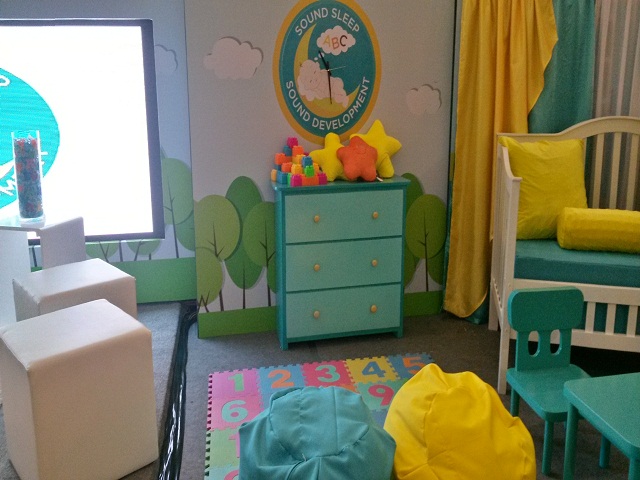Why sleeping soundly is so important for babies
The humming of the aircon. The fading tune of a musical mobile. The steady breathing of a baby nestled in the crib. These are the sounds associated with a good night's sleep. And a good, sound night's sleep means sound development for the tiniest, newest addition to your family.
The Sound Sleep, Sound Development campaign—initiated by Pampers and in partnership with the Mother & Child Nurses Association of the Philippines (MCNAP)—aims to educate moms on the importance of complete night-time sleep for babies. Pampers created an interactive exhibit at the SM Megamall Activity Center last Sept. 9 to give moms a glimpse of what happens to the baby while he or she sleeps.
Sleep is a key element in a baby’s development, specifically the development of the central nervous system (CNS), as highlighted by research. Sleep experts Alicia Estiller, president of the Mother & Child Nurses Association of the Philippines (MCNAP) and Philippine Society of Sleep Medicine's (PSSM) Dr. Luis Rivera Jr. agree that complete night-time sleep is very important to a baby's development and growth.
"[Sound sleep] is associated with more positive daytime behavior, mood, and temperament, and better physical functioning," added Estiller.

'Sound' sleep
Babies need twice as much sleep as adults do. For babies, sleep is the state of "recharging to undergo development." Parents presume babies are in a state of rest when they slumber, but according to Rivera, babies have two sleep cycles—deep sleep and active sleep, which rotate in a 60-minute cycle during sleep periods.
"Active sleep" or what we know as rapid eye movement (REM) is when the twitching, smiling or eye-fluttering occurs. The baby’s body is very relaxed but the mind is alert because of too much activity going on within the brain, which results in these movements. During active sleep, the baby's development is at play.
However, no one knows what's going on in the baby's brain during "Deep sleep" or Non-REM (NREM) sleep. According to some experts, it is in deep sleep that the deeper section of the brain develops further, making connections deep within the brain. If so, then this is definitely good for the babies.
Simply put, sound sleep is when babies get uninterrupted, quality sleep.
Sleep interruptions
Sleep affects a child's moods, immune system, and interacting abilities, among other things. It is very challenging for parents to ensure that the baby will be able sleep through the night, especially when there are so many factors that can interrupt even the deepest sleeping.
What happens when you attempt to feed your baby while asleep? Does repositioning its body for a diaper wetness check startle the baby? If your concerned measures interrupt your baby’s sleep, then you are doing more harm than good.
Hunger, illness, and discomfort are also factors that can disrupt a baby’s sleep or worse, keep them fully awake.
"That is why moms should learn to identify these external factors so they can appropriately address baby's concerns," said Rivera. Failure to address these disruptions lead to mood disturbances, fatigue or daytime lethargy, cognitive impairment, daytime behavior problems, academic problems, and/or use of stimulant medications.
"Sleep deprivation is associated with stunted growth, weight problems, low attention span, delayed learning, and behavioral problems," shared Estiller. Quality periods and uninterrupted sleep are as important as the nourishment your baby gets.
Ensuring sound sleep

- Learn your baby’s signs of being sleepy.
- Decide on where your baby will sleep. Familiarize him or her with a consistent bedroom environment in order to succumb to sleep faster.
- When the baby is drowsy but awake, that is the best time to put him or her to bed. This will help your baby "mark the territory" for where to sleep.
- Develop a daily sleep schedule, preferably every after feeding time in the morning or afternoon. Encourage night-time sleep no matter how long the naps last.
- Develop a bedtime routine like changing into pajamas, turning off the lights and other electronics, playing or singing a tune.
- Encourage the use of a security object like a "blankie" or a hotdog pillow.
- Sleep when your baby sleeps because you’ll be needing your energy once her or she wakes.
The challenge of a good night's sleep continues up to the toddler years for both the baby and mom. The best way to overcome the challenge is to have a better understanding of how complete and uninterrupted night-time sleep lead to optimum brain development. — VC, GMA News




